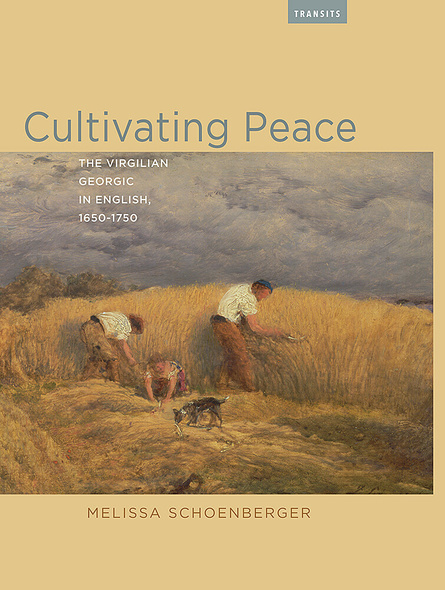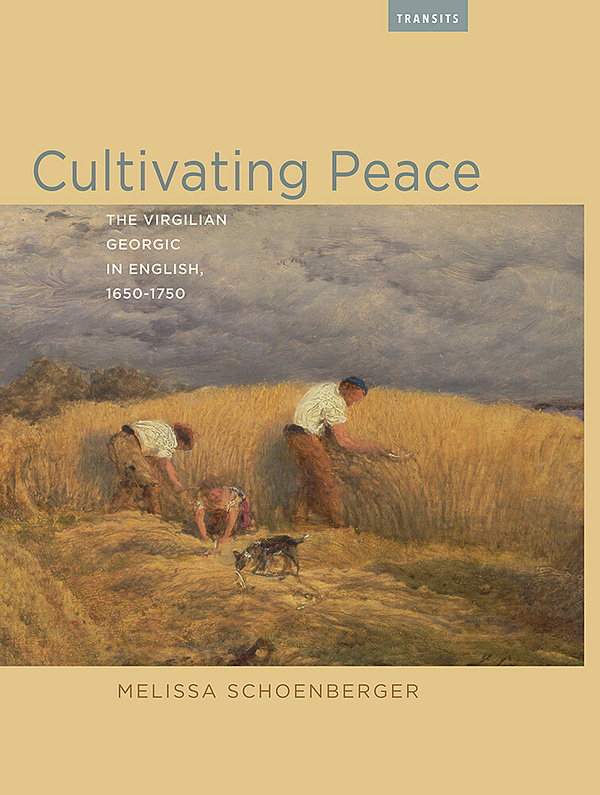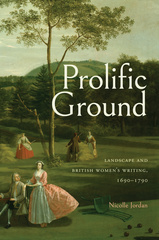
188 pages, 6 1/8 x 9 1/4
5 B-W photos
Paperback
Release Date:17 May 2019
ISBN:9781684480470
Hardcover
Release Date:17 May 2019
ISBN:9781684480487
Cultivating Peace
The Virgilian Georgic in English, 1650-1750
Bucknell University Press
During the decades following the English civil wars, British poets seeking to make sense of lingering political instabilities turned to Virgil’s Georgics. This ancient poem betrays deep ambivalences about war, political power, and empire, and such poets as Andrew Marvell, John Dryden, and Anne Finch found in these attitudes valuable ways of responding to the uncertainties of their own time. Composed during a period of brutal conflict in Rome, Virgil’s agricultural poem distrusts easy stability, urging its readers to understand that lasting peace must be sowed, tended, reaped, and replanted, year after year. Like the ancient poet, who famously depicted a farmer’s scythe suddenly recast as a sword, the poets discussed in Cultivating Peace imagine states of peace and war to be fundamentally and materially linked. In distinct ways, they dismantle the dream of the golden age renewed, proposing instead that peace must be sustained by constant labor.
Published by Bucknell University Press. Distributed worldwide by Rutgers University Press.
Published by Bucknell University Press. Distributed worldwide by Rutgers University Press.
Cultivating Peace is an extremely smart examination of what might be called 'the georgic mode' in English verse of the seventeenth and eighteenth centuries, starting with Virgil … It is a significant piece of scholarship that should be of interest both to classicists and to scholars of English poetry in the long eighteenth century. The writing is clear and jargon free, the readings perceptive; we not only get a much richer, more complex, sense of how the georgic mode worked than we had before, but we also see it in historical context.
Melissa Schoenberger's important, compelling study provides an innovative re-evaluation of English georgic's development in the early modern period and its relationship to the laborious art of peace-making. Schoenberger identifies how poets from Marvell to Smart respond to the political aspects of Virgil's Georgics, particularly with regard to the farmer/statesman's ceaseless toil against disorder and chaos and his failure to secure a stable future. In doing so, this study convincingly presents peace-making as a fundamentally georgic act and advances our understanding not only of Virgil himself but also his wider cultural legacy.'
A well written and cogently argued book that should be welcomed for its refreshingly new reading of the Virgilian georgic mode in English poetry of the long eighteenth century. Its strengths are many, not least, its juxtaposition of close reading with a keen sensitivity to social and political contexts.
The narrative voice will often alight delicately on its objects only for them to morph into new ones almost as soon as they are observed. This, too, is a lovely imitative echo of Virgil’s light didactic touch....Rich and evocative.
Cultivating Peace is a fascinating book about Virgil's didactic agricultural poem The Georgics and the poetry and political thinking that it inspired in late seventeenth- and early eighteenth-century England. Melissa Schoenberger recovers, from Virgil's poem, a distinctively georgic understanding of peace as mutable and contingent.'
Cultivating Peace is an extremely smart examination of what might be called 'the georgic mode' in English verse of the seventeenth and eighteenth centuries, starting with Virgil … It is a significant piece of scholarship that should be of interest both to classicists and to scholars of English poetry in the long eighteenth century. The writing is clear and jargon free, the readings perceptive; we not only get a much richer, more complex, sense of how the georgic mode worked than we had before, but we also see it in historical context.
Melissa Schoenberger's important, compelling study provides an innovative re-evaluation of English georgic's development in the early modern period and its relationship to the laborious art of peace-making. Schoenberger identifies how poets from Marvell to Smart respond to the political aspects of Virgil's Georgics, particularly with regard to the farmer/statesman's ceaseless toil against disorder and chaos and his failure to secure a stable future. In doing so, this study convincingly presents peace-making as a fundamentally georgic act and advances our understanding not only of Virgil himself but also his wider cultural legacy.'
A well written and cogently argued book that should be welcomed for its refreshingly new reading of the Virgilian georgic mode in English poetry of the long eighteenth century. Its strengths are many, not least, its juxtaposition of close reading with a keen sensitivity to social and political contexts.
The narrative voice will often alight delicately on its objects only for them to morph into new ones almost as soon as they are observed. This, too, is a lovely imitative echo of Virgil’s light didactic touch....Rich and evocative.
Cultivating Peace is a fascinating book about Virgil's didactic agricultural poem The Georgics and the poetry and political thinking that it inspired in late seventeenth- and early eighteenth-century England. Melissa Schoenberger recovers, from Virgil's poem, a distinctively georgic understanding of peace as mutable and contingent.'
Melissa Schoenberger is an assistant professor in the department of English at the College of the Holy Cross in Worcester, Massachusetts, where she specializes in Restoration and eighteenth-century poetry. Her articles have appeared in Restoration: Studies in English Literary Culture 1660–1700 and Translation and Literature.
Introduction: The Arts of Peace
Chapter 1: Mutability: Cycles of War and Peace
On Mutability: Virgil’s First Lesson
Before Marvell: Georgic Mutability in England
The Trap of War and The Map of Paradise: Marvell’s Vision of Peace
Chapter 2: Translation: Virgil and Dryden in 1697
The English Virgil
Dryden’s Georgics: “Nor When the War is Over, Is it Peace”
From Peace to War: The Aeneis
Chapter 3: Contingency: The Georgic Poetry of Anne Finch
A Virgilian Retreat
Finch and the Force of Fable
Chapter 4: Imitation: The Georgics before and after 1713
John Philips and the Inmate Orchat
From Didactic to Descriptive
After Thomson: Christopher Smart, The Hop-Garden, and the End of Georgic Peace
Conclusion: “At Their Hours of Preparation”
Bibliography
Index





